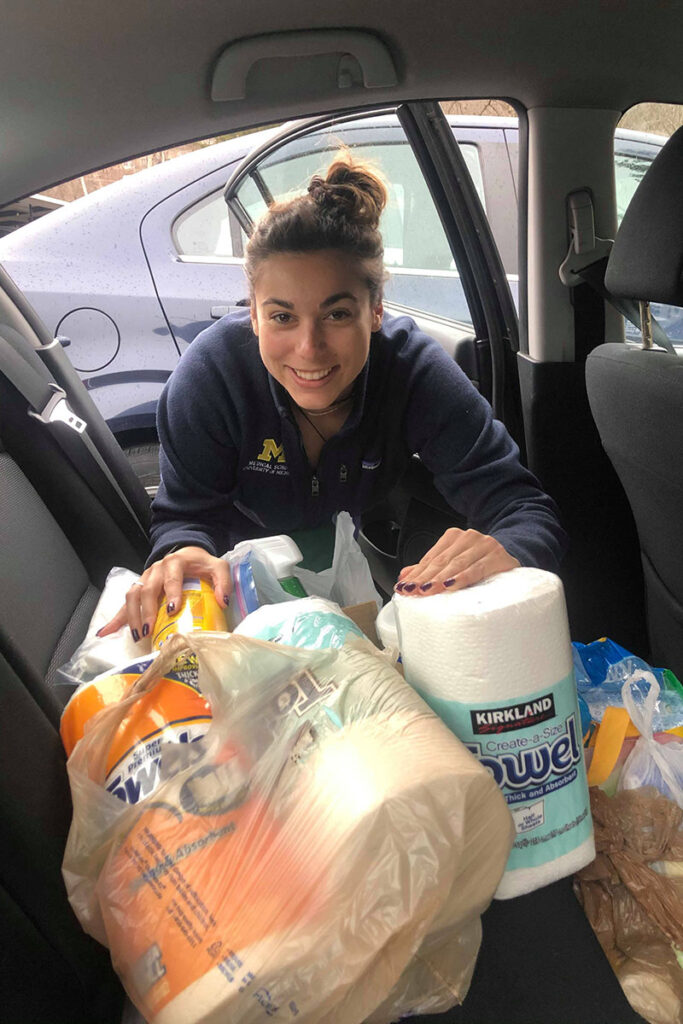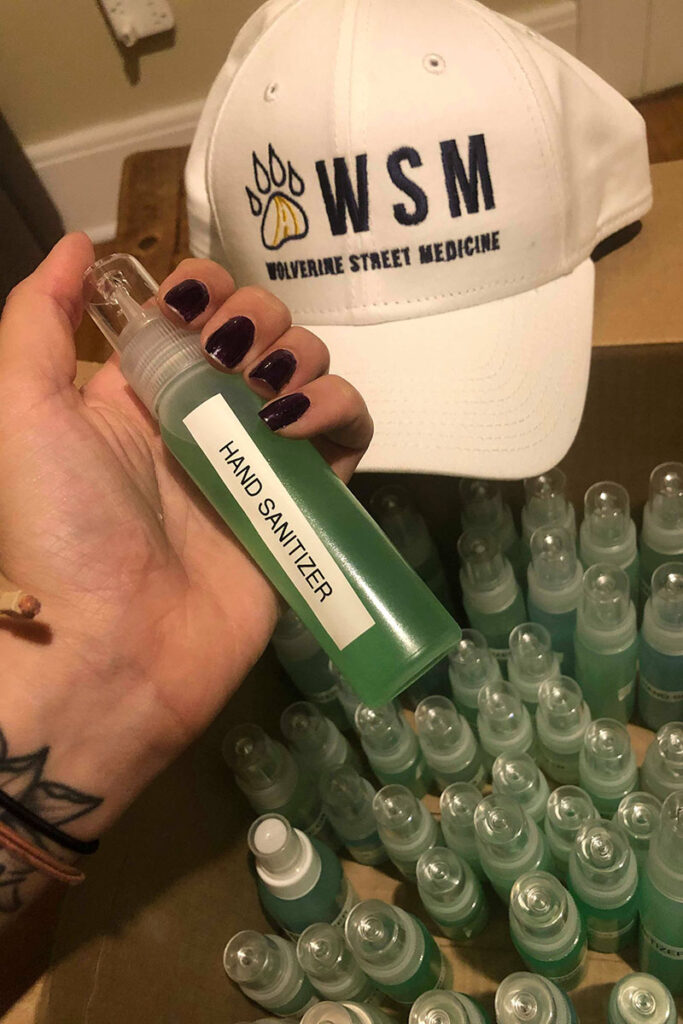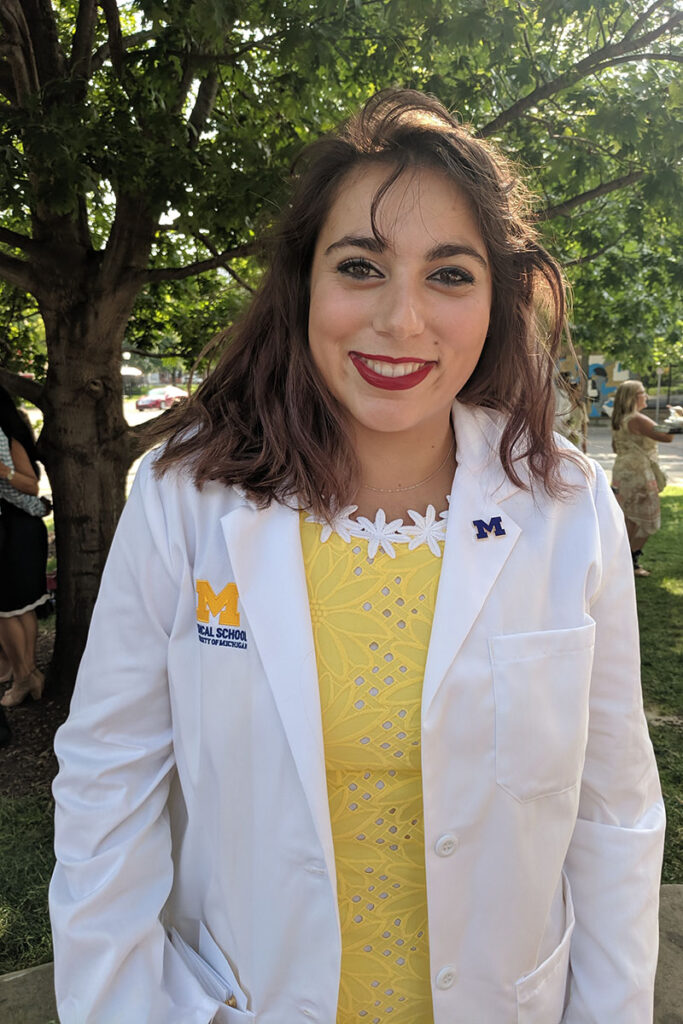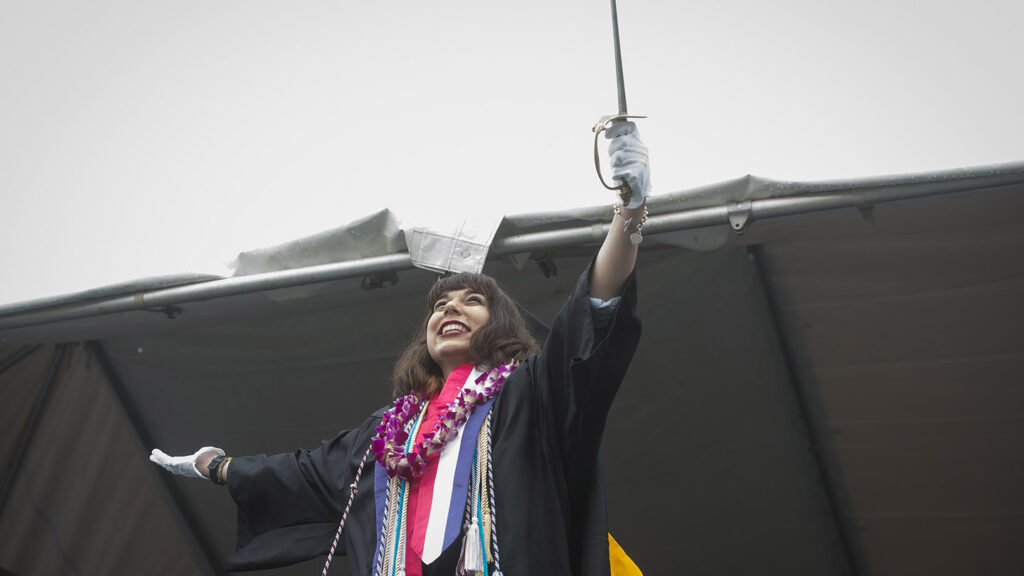Medical student Kenzie Corbin ’18 provides homemade hand sanitizer to homeless and spreads goodwill amidst coronavirus crisis
By Stella Katsipoutis-Varkanis
When University of Michigan closed its classroom doors, halted student clinical rotations, and made the switch to online learning March 16 in an effort to stave off the rapidly growing threat of COVID-19, first-year medical student Kenzie Corbin ’18 immediately asked herself one question: What about the homeless?
“Patient care is the main reason why I’m here, and when there’s a crazy thing like this huge pandemic, the first thing I want to do is help people,” Corbin says. “I pause and think about who are the most vulnerable, who are the people that everyone is forgetting about when the world is in crisis, and those are the people that I want to bring light to and make sure they’re cared about.”

Corbin collected donations from fellow medical students to distribute to the homeless.
As the number of coronavirus cases rose throughout the country, Corbin realized that some members of her community are without access to not only health care and shelter, but also to basic self-care supplies that are crucial weapons in the fight against infection.
“The No. 1 thing that people are saying is wash your hands, stay inside,” Corbin says. “But what happens if people don’t have access to water, don’t have soap, and have nowhere to go?”
These are the questions that led Corbin to take on the mission of gathering hand sanitizer and distributing it to those in need. As she came to find that the product was widely unavailable in stores, Corbin quickly realized she would have to make her own sanitizer from scratch. And being that the necessary ingredients (isopropyl alcohol, aloe vera, and tea tree essential oil) were also in short supply, Corbin decided to tap into her network of fellow students—who swiftly responded with generous monetary and material donations.

Corbin and a classmate concocted hand sanitizer using a recipe recommended by the CDC.
“There’s 170 people in my class of first-year students, and I just sent them a group message. Within seconds, people started donating and letting me know what ingredients they had from their own personal supplies,” Corbin says.
In just a few days, Corbin and a classmate concocted homemade hand sanitizer using a recipe recommended by the Centers for Disease Control and Prevention (CDC), and then packaged it into 100 1- and 2-ounce plastic bottles. “I used cookie icing containers from Amazon because they’re about the same size [as hand sanitizer bottles] and have the same little thin tip,” she says. They then delivered the finished product to Delonis Clinic in Ann Arbor, Mich., and Wolverine Street Medicine-partnered NSO Clinic in Detroit.
While Corbin’s undertaking initially started out as a means to provide the homeless with hand sanitizer, it soon blossomed into something much greater. As a result of overwhelming student demand, Corbin had to expand on a Google spreadsheet that she originally created to keep track of supply donations, and create a larger shared document in which students could offer their various talents and services to the community in response to the coronavirus pandemic.

Before embarking on medical school, Corbin completed degrees in neuroscience and French at Lafayette.
“Looking at the spreadsheet now, there are probably 40 to 50 people signed up to help in different ways,” Corbin says. “There are some engineering students working on making ventilators. There are people working on a hotline for the homeless. We have medical students offering to provide child care support for residents, physicians, and nurses who have to still go to work and whose kids are home because the schools are closed. There’s also meal delivery, tutoring, and blood donation efforts. I’m blessed to be among a bunch of amazing other students who are also really committed to helping the community.”
Corbin—who was awarded the Pepper Prize when she was a senior at Lafayette, and who hopes to work in the nonprofit public health sector after medical school—plans to continue her hand sanitizer project as long as supplies are available.
Now that many colleges and universities across the country are operating strictly online in response to the COVID-19 crisis, Corbin encourages students everywhere to use their spare time to volunteer and serve their communities in any capacity they can—such as tutoring online, donating blood, or sharing accurate information on social media—but also to remember to put their own well-being first.
“I’ve had people reach out to me and say they want to help and get involved, but they themselves feel too emotionally exhausted by it all,” she says. “Your own personal mental health and wellness is important too. And if you aren’t personally doing OK, do not feel all this external pressure just to go out and change the world. Because the biggest thing that we can do to help is to just stay home and monitor yourself.”

Pepper Prize recipient Corbin holds the sword of the Marquis de Lafayette at 2018’s Commencement.



